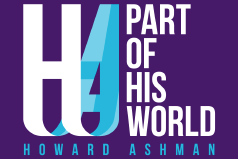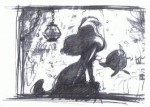And Now, Without Further Delay - John Musker Question Number 8
John Musker back behind the eight ball with question number 8: How much input did you have on Mermaid’s songs? Were they perfect to begin with, or did you have to advise Howard to change the lyrics?
When Ron Clements and I wrote our ten-page treatment for Little Mermaid, we had ideas for a few songs. We thought Ariel would have a song in her grotto. Howard agreed but it was important to him that the song express her longing for the human world and not simply for a human prince. He compared her to a girl who had never walked, who dreamed about one day being able to take her first step.
The other thing that Howard insisted on was that this song, and really everything he wrote, must be specific. He said all good writing is about the specific. He was adamant that he was not a “June, moon, spoon” lyricist.
When Ron and I first met with Howard, he hadn’t decided which composer he would work with. He said he might work with Marvin Hamlisch on the songs. We were OK with that if that’s what Howard wanted, but one day we got a call from Howard that he wanted once again to work with Alan Menken.
Part of Your World was the first song for Mermaid that Howard and Alan wrote.
Ron and I went to New York in the winter of 1986 to meet for the second time with Howard, and to hear Part of Your World. We went to Howard’s apartment in Soho. He had a piano, and it was at that piano that we met Alan for the first time, as he played for us Part of Your World. On the demos for most of the ballads on which they collaborated, Alan tended to do the lead vocal. But as we sat ourselves there beside them, Howard performed Ariel. Howard became Ariel before our eyes and ears, singing fervently with unabashed sincerity. Traffic whizzed by below us out on that cold December night as he poured out his heart in song. He looked up to the ceiling of his apartment as he sang, and it became the out of reach human world. He made us see it, too, and feel it, this far off place of wonder that so entranced this little mermaid (for Howard was it the world of Disney animation?) He made us root for this mermaid so desperate to belong to that distant and untouchable realm. It was moving and we loved the song.
Later, when Howard came out to California we did talk to him about a few notes on the lyrics to both this and its reprise, which Ariel was to sing later in the film. I had a few somewhat idiotic notes that Howard dismissed quickly. I am embarrassed to admit them, but I’ll mention one. I had a suggestion about Howard’s lyric, “I wanna be where the people are.” I told Howard I was concerned that the phrase “the people” sounded formal and like a political statement. I thought we should drop the word “the.” Now, I come from the fine state of Illinois where once upon a time, a populist governor (and one of the few who didn’t later do time in prison) named Dan Walker, talked during his campaign about “the pee-pull” enough that it became a bit of a joke. I don’t know if that’s what sent me in a political direction when I heard that phrase or what.
Howard sat there in his LA office in the trailer where we did the preproduction for Mermaid. He had beside him the cassette recorder on which he’d just played the song’s demo, and he stewed. His brow was furrowed. He was appalled by my suggestion.
“What?! She’d have to hold the word ‘where’ longer to make that work.”
He sang it aloud and said, “That sounds terrible!... No!” Howard generally guarded his lyrics with the primal ferocity of a mother bear defending her doe-eyed cubs. In hindsight, I’m glad Howard didn’t change the lyric. It was a silly note.
Howard swatted away almost all suggestions on lyric changes like they were so many gnats, annoying and easily disposed of. So it was something of a shock when we raised a couple of objections that he actually agreed with
Howard’s initial lyrics for Part of Your World contained several beautiful images as she described the contents of her grotto. He mentioned “fine china” and books bound in “leather and gold” and maybe feathers also, as I remember. Ron and I mentioned to Howard that Ariel’s “teacher” in all matters human was the seagull Scuttle, a know-it-all idiot who had everything wrong. He had oddball names for all things human and completely bollixed ideas of their functions. So we thought these lyrics where Ariel used language accurately was inconsistent with “dingelhoppers” and “snarfblatts.” Howard mulled this, and later came back with a revised lyric where Ariel now had “thingamabobs” and “whozits and whatzits galore.” We were very happy with this, as was Howard. We traded some poetry for something both more consistent with the rest of the movie and funnier as well.
In Howard’s initial pass on the reprise of Part of Your World, sung by Ariel after saving Prince Eric from the shipwreck and hauling him up on the beach, Howard played it very sadly. She still sang a soaring emotional statement, but it was a sad one as she lamented that “I’ll never be...part of that world…” We told Howard because Ariel had such a determined nature, and was fundamentally so active in the pursuit of her dreams, the tenor of what she sang should be optimistic and reflect her conviction that somehow she would win that Prince someday. Howard once again surprised us by, after careful consideration, agreeing to make this a more positive statement. It gave her and the movie more foreword momentum, and set up a looming moment of truth with her father. So it became, “ I don’t know when, I don’t know how, but I know something’s starting right now…Watch and you’ll see…someday I’ll be…part of your world…
I might mention that Ron and I originally thought that Sebastian’s song where he tries to convince her to remain below could be called “Mermen.” In it, we envisioned that Sebastian would extol the virtues of a series of hunky mermen. We were influenced, as I recall, by the music video of the Van Halen cover of the Beach Boys’ “California Girls” where David Lee Roth ran around praising and ogling various babe-ular California girls. Howard thought otherwise, that it should be a more encompassing “sell” of undersea life. Thank goodness, or Under the Sea might not have emerged as the show-stopper that it was and is.
There were some questions about the set up of the conflict between Ursula and Triton at the beginning of the film, and just exactly what their back story had been. Howard always thought they should be brother and sister (see my earlier post about Howard’s Dynasty devotion.) So he expanded the song Fathoms Below to lay out a whole Machiavellian interfamily conflict, explaining the witch’s treachery and banishment. Roger Allers, the brilliant director, then a top story artist, was assigned to board this (Roger boarded a number of the songs on Mermaid including Part of your World, Kiss the Girl and Poor Unfortunate Souls which he did with Gary Trousdale. Roger (and Gary) invented lots of funny gags, staging ideas, and acting beats that made it into the final film.) Roger thought this longer version of Fathoms was too much exposition right at the top of the film to have to wade through. Roger boarded it despite his misgivings and gave it his all, but when we screened the rough story reels, it did indeed seem very dense and slow. Howard relented and we returned to a shorter statement. Even though there were hundreds of drawings that Roger had produced for it, Roger was happy to see it at a much shorter length.
There were a few trims here and there in the other songs, mostly for length issues. Howard originally conceived the idea of an exuberantly sadistic chef doing a number about preparing crab. Les Poissons enabled Howard to indulge his love of all things French and of food. But his original idea was that the song was sung at a cooking class that Sebastian wanders into. The song was basically a lecture. We wound up eliminating the “class” idea in the interests of simplicity but the lyric still plays like he’s instructing an unseen listener. It’s Howard’s take on Julia Child or possibly Howard’s take on Dan Aykroyd’s SNL version of Julia Child.
The path to the screen of the witch’s song was rather circuitous, although maybe tentacled or serpentine are the more appropriate adjectives for it. We had written our first draft script with mentions of where songs might go since Howard was busy with Smile and couldn’t write the movie’s songs until his show was properly launched. So we wrote Ursula’s dialogue and “temptation” scenes knowing Howard wanted to musicalize them. I believe we heard later about Howard’s first attempt at an Ursula song entitled Silence is Golden. But there was something about it he thought could be improved and once he read our script, he incorporated our dialogue about “poor souls with no one else to turn to” into the lyric for a new song, and in fact into the title. I don’t think he ever played Silence is Golden for us and we only heard it later when Disney released demos of the Ashman/Menken songs on the Music Behind the Magic collection.
It was interesting to hear Howard talk about Poor Souls and the way it was structured. He said it was designed as a “very Brecht-Weill” piece. It was multi-part, alternating between sung sections and dialogue (some of which was us, some of which was Howard.) Once Ariel agrees, the song has a “spell” section as Ursula removes Ariel’s voice. Howard described the song as having “a very definite shape.” He described it in almost graphic terms and he said good songs often have a shape to them that is as much a part of them as the specific lyrics and melody. Its climax would have a thrust that would propel both Ariel and the audience up to the surface and into the human world. Poor Souls has a unity despite its different sections, and Howard was a master at orchestrating the storytelling into sung moments.
In a future post I’ll talk more about this number, the struggles to do it justice, about Howard’s run-in with Elaine Stritch, and what we stole from her.





